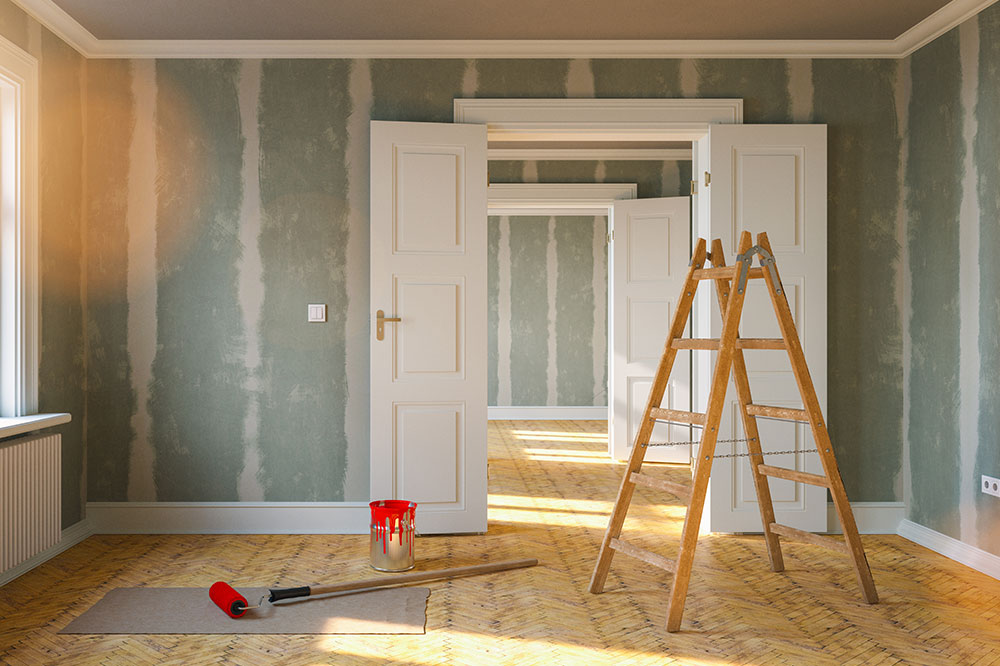Avoid these 17 common home renovation mistakes

Revamping your home entails joy as well as responsibility. Home renovations are a major expense, with kitchen remodels costing an average of $22,000, and smaller projects, such as bathrooms, costing around $10,000. These projects also require a fair amount of your time and attention, as you manage the workforce, look into budgeting, and work around technicalities. Steering clear of these common home renovation mistakes can help you save money and time.
Setting an unrealistic budget
Even the most strategically planned renovation projects can end up costing you more than your original budget. To avoid any unforeseen circumstances, account for 20% extra when creating a budget. This will help you incorporate any additional expenses you may encounter.
Forgetting to consider daily activities
When you’re looking to renovate the home you are living in, it is important to consider how your daily life will be affected during the renovation. Be sure to have a plan to work around managing your day-to-day activities before you start.
Not complementing the existing style
Your renovation plans are meant to modify your living space, so you do not need to plan everything based on the existing structure. However, complementing the current style can help make your home look put together and also improve its resale value in the future.
Being too trendy
Trends come and go, so don’t be too eager to redesign your home based on one. Your home renovation style could impact your home’s market value in the long run. So, look for sleek, classic designs, or consult an architect for the best results.
Buying furniture and home décor pieces in advance
Don’t be in a rush to buy appliances, furniture, and other products for your renovated home. Wait until the plans are finalized and you have a clear idea of measurements such as carpet area, counter space, and more. If you’re planning this well in advance, consider scheduling your carpeting or flooring in November and December, since you can snag several product sales and negotiate better prices with contractors.
Trying to rush the job
If you’re inspired by the timelines on television renovation shows, you may want to alter your expectations. Do not try to rush your renovation plan within a week or less, as this will not give you adequate time to prepare and work according to plan, or address any unforeseen mishaps. It may also compromise the quality of work. Major renovation projects may take anywhere between 3 to 6 months to complete.
Not checking references
When hiring companies or contractors to carry out your home renovation project, be sure to do a background check. Speaking to their former clients can also help you gauge what to expect from them.
Opting for the lowest bid
There are several ways of finding a contractor for your project. One common way people hire contractors is by setting up a bidding system. While choosing the cheapest bid may feel enticing, it is important to consider the quality of their craftsmanship before making your final decision.
Miscommunicating
It is important to keep all lines of communication open with all the parties involved in the project. Establish the best way to communicate with your contractor, whether it is via text, call, or in person. This will help ensure a hassle-free experience.
Thinking you know it best
Everyone has an inspiration they wish to work towards. While that is perfectly fine, it is also important to be cognizant of the realistic limitations certain designs may pose. To work around these, hire an interior designer or an architect to help you ensure a good-quality design that is made from elements that work well together.
Neglecting the plan
Before starting your renovation project, you should have a comprehensive written plan that includes every single detail, including the products to be used and your choice of finish. Do not work with any contractor who does not share a plan with you. While you may still encounter unexpected problems that require some adjustments, a large part of your project should proceed based on your originally documented plans.
Focusing solely on appearances
Esthetics are often the primary focus during a renovation project. But it is also important to address structural and safety issues when revamping your home. This includes ensuring a strong foundation and sub-flooring and upgrading the electrical system. Taking these into account during large renovation projects can reduce the risk of having to damage parts of your home to fix any problems later.
Ignoring lighting
Lighting is instrumental in determining the overall feel of your home. Speak to a lighting specialist to create a lighting plan. This plan will guide the kind of lights you invest in (such as general, accent lighting, or smart lighting), and where they will be placed for optimally brightening your home.
Buying cheap materials
Don’t try to economize on building materials because it will only make you spend more money on upkeep. Instead, invest in durable and high-quality materials for your home as these will last long.
Making the doorways and halls too small
When finalizing your plans, it is also important to check whether the doorways and halls are wide enough to allow the seamless movement of your furniture and appliances.
Ignoring window quality
Another aspect of your home to invest in are the windows. Good-quality windows with the right thermal protection can make your home perfect for any weather and keep your utility bills low in the future.
Forgetting about landscaping
The first thing people see when they visit your home is the yard. Whether you are expecting guests or potential buyers, a neat, tidy, and landscaped yard can go a long way in making a positive impression. So, make sure to accord a small portion of your budget to clearing up and beautifying your yard as well.
Keep these mistakes in mind before embarking on your next project for a fun, relaxed, and hassle-free home renovation experience.









